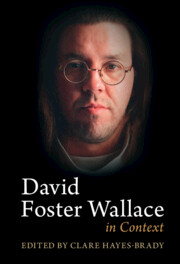Book contents
- David Foster Wallace in Context
- David Foster Wallace in Context
- Copyright page
- Contents
- Figures
- Contributors
- Acknowledgments
- Abbreviations
- Introduction
- Part I Contexts
- Part II Ideas
- Part III Bodies
- Part IV Systems
- Chapter 26 Infinite Jest as Opiate Fiction
- Chapter 27 David Foster Wallace and Racial Capitalism
- Chapter 28 Language and Self-Creation
- Chapter 29 Very Old Land
- Chapter 30 David Foster Wallace’s Ecologies
- Chapter 31 “I Could, If You’d Let Me, Talk and Talk”
- Chapter 32 David and Dutch
- Chapter 33 David Foster Wallace and Publishing
- Chapter 34 Author Here, There and Everywhere
- Works by David Foster Wallace
- Bibliography of Secondary Sources
- Index
Chapter 34 - Author Here, There and Everywhere
David Foster Wallace and Biography
from Part IV - Systems
Published online by Cambridge University Press: 18 November 2022
- David Foster Wallace in Context
- David Foster Wallace in Context
- Copyright page
- Contents
- Figures
- Contributors
- Acknowledgments
- Abbreviations
- Introduction
- Part I Contexts
- Part II Ideas
- Part III Bodies
- Part IV Systems
- Chapter 26 Infinite Jest as Opiate Fiction
- Chapter 27 David Foster Wallace and Racial Capitalism
- Chapter 28 Language and Self-Creation
- Chapter 29 Very Old Land
- Chapter 30 David Foster Wallace’s Ecologies
- Chapter 31 “I Could, If You’d Let Me, Talk and Talk”
- Chapter 32 David and Dutch
- Chapter 33 David Foster Wallace and Publishing
- Chapter 34 Author Here, There and Everywhere
- Works by David Foster Wallace
- Bibliography of Secondary Sources
- Index
Summary
In the famous 1993 interview with Larry McCaffery, David Foster Wallace called himself “an exhibitionist who wants to hide.” It’s a quote that many Wallace scholars and fans can throw out at a moment’s notice as an example of Wallace’s endearing, self-deprecating wit. However, as self-effacing as that comment may seem, it nevertheless suggests concealment, contradiction, perhaps even deceit. For every aspect of Wallace on display, another remains hidden from view. Nowhere is this more apparent than in the way he constructs his biography in his writing. Through carefully selected details and statements in fiction, essays and especially interviews, Wallace crafts a literary and public persona that is very much at odds with (or a heavily curated version of) his actual life. Much of the backlash against Wallace and the various debates over whether he ought to be studied, taught, respected or outright canceled stem from the disconnect between the biography presented to his readership and the actual human who has emerged in subsequent biographies, memoirs, testimonials, archives and tweets that have made writing about Wallace a cottage industry in publishing.
As much as these paratexts may appear to carry more authority as more accurate depictions of the “real” Wallace, it is important to examine how these accounts are themselves constructed versions of Wallace grappling with Wallace’s (and at times the author’s own) place in a rapidly shifting literary and media culture. Discussion of the many constructed biographies of David Foster Wallace, including the likes of D. T. Max, David Lipsky, Mary Karr, Jonathan Franzen, Jeffrey Eugenides and more, would show how much literary culture has changed in the decade since his death and show how much David Foster Wallace is a distinct product of his own time and place. Wallace and Franzen may have believed that writers such as Pynchon and DeLillo had an easier, less public literary life than they did because “they made their bones in a different time,” but the past decade has shown that Wallace made his bones in a different time as well, to the extent that he would not have been able to craft such a persona free from public scrutiny (or the truth) today. In this regard, Wallace may truly be the last of his kind, part of an extinct breed: the last white male writer of the twentieth century, the greatest, male-est narcissist.
- Type
- Chapter
- Information
- David Foster Wallace in Context , pp. 368 - 378Publisher: Cambridge University PressPrint publication year: 2022

